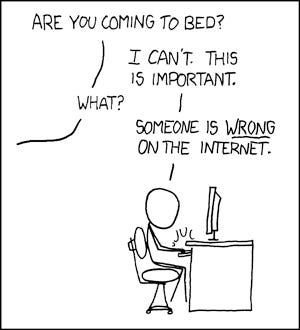- Mar 16, 2019
- 4,022
There's a lot of reporting about YouTube's war on ad blockers and Google's new Chrome extension limits, and most of it is wrong.

Google’s Manifest V3 migration for Chrome extensions has been controversal, especially with its changes to how content blockers (ad blockers) are allowed to function, and how that might be connected to YouTube’s new blocking mechanism for adblock extensions. Unfortunately, it’s been hard to understand exactly what is going on, because some tech news outlets don’t seem to have a grasp on what’s happening.
You might be tired of hearing about YouTube’s adblock measures and Chrome extensions, because I sure am! I’ve had to mute the words “youtube” and “adblock” on my social feeds and unsubscribe from the tech communities on Lemmy, because it’s all anyone wants to talk about. I also want to be done talking about it, but I made the mistake of reading a few recent articles about the situation. Now, like the person in the classic xkcd comic, I am procrastinating what I need to do today so I can correct other people.

I already explained what is happening with Chrome extensions and YouTube’s war on ad blockers. The article about Chrome extensions was written partially to dispute claims that Google was going to “disable uBlock Origin on Chrome” and “force-block ad blockers” and other things that are not true (but have been repeated endlessly by journalists and tech enthusiasts). However, there is now even more bad reporting about Google’s war on ad blockers.
The start
Engadget published an article on December 1 titled “Inside the 'arms race' between YouTube and ad blockers.” It’s mostly an interview with developers of popular adblock extensions, where they discuss the workarounds they are implementing for YouTube’s new adblock detection. Some of them are now updating their block lists multiple times a day to account for YouTube’s counter measures.
The article includes a quote from the director of product and engineering at Ghostery with some added commentary:
Keeping pace with YouTube will likely become even more challenging next year, when Google’s Chrome browser adopts the Manifest V3 standard, which significantly limits what extensions are allowed to do. Modras said that under Manifest V3, whenever an ad blocker wants to update its blocklist — again, something they may need to do multiple times a day — it will have to release a full update and undergo a review “which can take anywhere between [a] few hours to even a few weeks.”
“Through Manifest V3, Google will close the door for innovation in the ad blocking landscape and introduce another layer of gatekeeping that will slow down how ad blockers can react to new ads and online tracking methods,” he said.
This is (at least partially) not true. The new Manifest V3 standard requires that............

Tech media doesn't understand ad blockers or Chrome extensions
There's a lot of reporting about YouTube's war on ad blockers and Google's new Chrome extension limits, and most of it is wrong.


